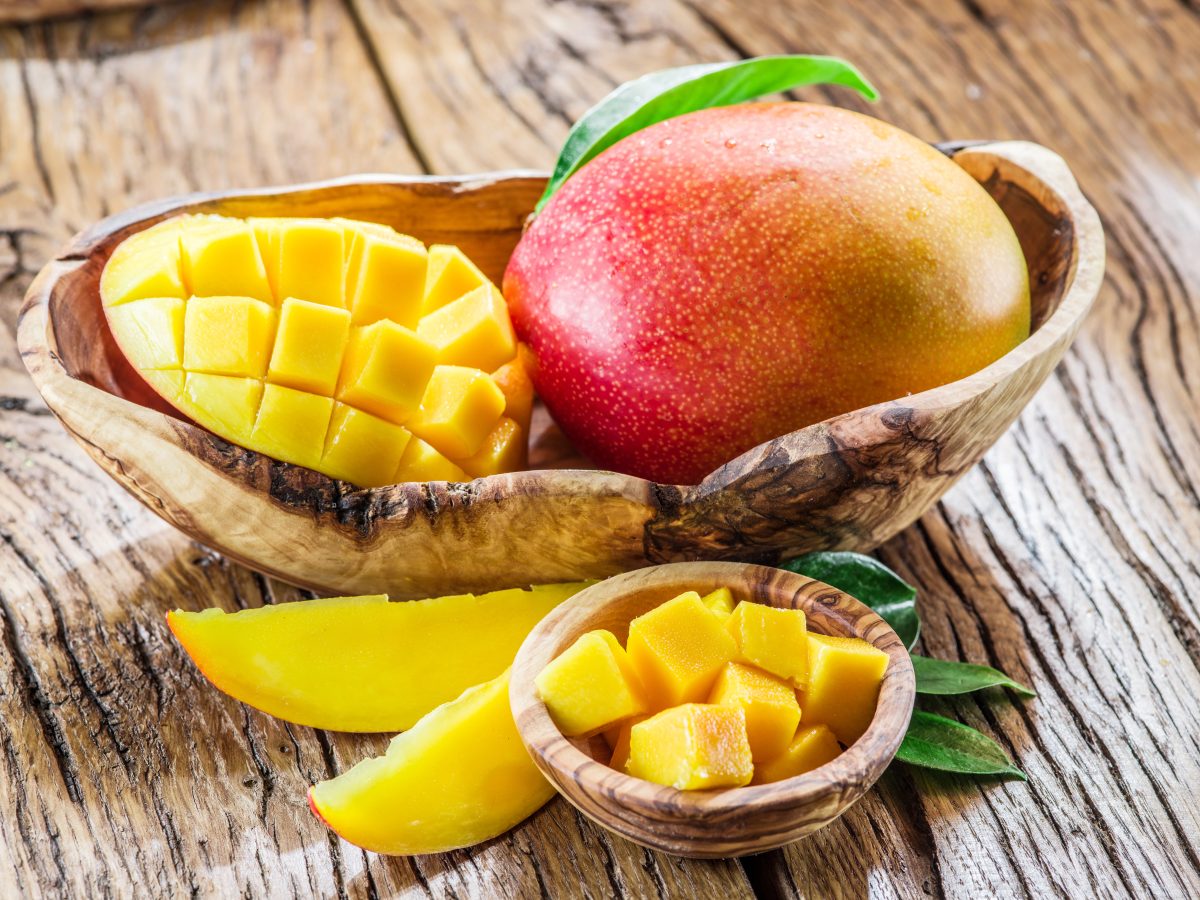Mango FODMAP content explained
- Low FODMAP diet
If you are curious about the mango FODMAP content, this article is for you. Besides fresh mango FODMAP content, we will also discuss FODMAPs in dried mango, mango juice, and mango powder.
This article will also provide tips on including mango in your diet and substitutes for mango. At the bottom of this article, you can check out delicious low FODMAP recipes.

Mango FODMAP content
Fresh mango is low FODMAP at 40g, which is quite a small portion considering that a portion of fruit is around 80g (1).
Larger serving sizes should be avoided during the restriction phase on the low FODMAP diet due to the fructose content. Fructose is a monosaccharide, a type of sugar found in many fruits and vegetables.
Fructose is a type of FODMAP and also occurs in:
- Mandarin
- Watermelon
- Tomatoes
Dried mango FODMAP content
Dried mango is high FODMAP due to its fructan content (1). Fructans are oligosaccharides, large molecules made from chains of fructose.
If you like dried fruits, you can replace dried mango with (1):
- Banana chips (check the low FODMAP portions in the Monash app)
- Cranberries
- Dried dates
Mango juice’s FODMAP content
Monash University, which is the centre that tests FODMAP contents, has not tested mango juice. However, it is likely high in FODMAPs as only such a small amount of fresh mango is allowed, and juice is a concentrated format.
Again, you do not have to restrict all fruit juices. There are still many options when choosing low FODMAP fruit juices, including (1):
- Pineapple juice
- Cranberry juice
- Orange juice
Mango powder (amchur) FODMAP content
Mango powder is low FODMAP up to 2 g (1).
This can add a sour fruity flavour to the dish and is especially popular in Indian cuisine.
If you like seasoning food with mango powder, stick to the low FODMAP serving. But if you need some inspiration on low FODMAP seasoning, check the articles: “Low FODMAP Spices” and “Low FODMAP Herbs”.
What can I substitute for mango on the low FODMAP diet?
As mangos are low FODMAP in small portions, we will give you some suggestions substitutes.
According to Monash, the following fruits are FODMAP-free, which means you can consume them without restriction:
- Papaya
- Starfruit
Tasty swaps for mango would also make the following fruits. However, check the Monash app for low FODMAP portions:
- Unripe banana
- Kiwi
- Pineapple
Health benefits of mango
Mango is not only flavourful fruit but can also contribute to overall health.
Mango is rich in vitamin C content (2). This vitamin works as an antioxidant, which helps to protect cells and keeps them healthy. Vitamin C also helps to heal wounds and contributes to healthy skin, bones, etc. (3)
Another compound found in mango is folate (2). Folate helps the body to form red blood cells, has a role in the immune system function and many more (4).
Mango is also packed with a variety of the following nutrients (2):
- Vitamin B6
- Vitamin A
- Manganese
- Potassium
- Copper
Moreover, mango contains phenolic acids, which have been shown to protect against oxidative stress (5). Oxidative stress is caused by smoking, alcohol, air pollutants etc.
Low FODMAP mango recipes
Mango has a sweet tropical taste, and it can add freshness to your low FODMAP meals and drinks. We gathered some delicious recipes for you to try at home.
Sweet recipes to try:
- Creamy Low-FODMAP Pineapple Mango Sorbet
- Low FODMAP Iced White Tea With Mango
- No Bake Low FODMAP Fruit Tart
Savoury recipes to try:
- Low FODMAP Okra, Mango & Mint Salad
- Low FODMAP BBQ Salmon with Mango-Pineapple Salsa
- Low FODMAP Cajun Chicken Tacos with Mango Salsa
Summary
Mango is a high FODMAP fruit due to the FODMAP content of fructose. However, you do not have to restrict it entirely while on the low FODMAP diet. It is low FODMAP up to 40 g, but dried mango and mango juice should be avoided due to the higher content of FODMAPs.
Mango low FODMAP serving is relatively small, so if you do not know how to include it in your meals, check out the recipes linked above.
Written by Barbara Lešnik, Student Dietitian, reviewed by Kirsten Jackson, Consultant Dietitian BSc Hons, RD, PG Cert